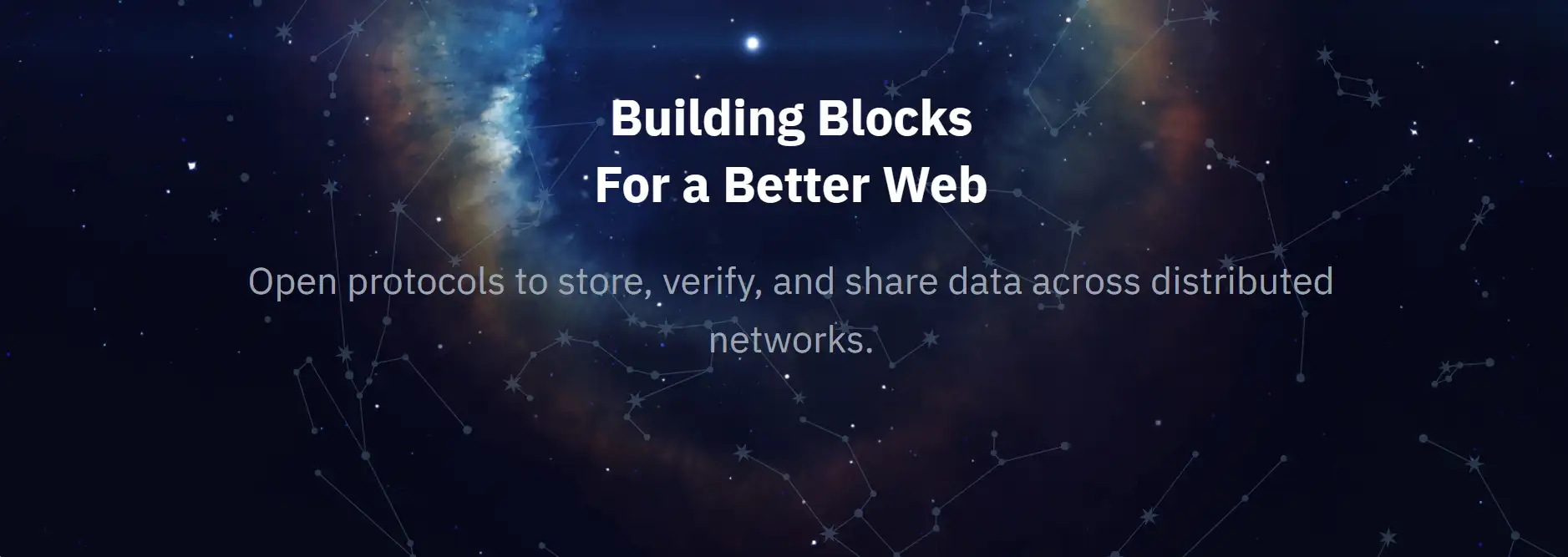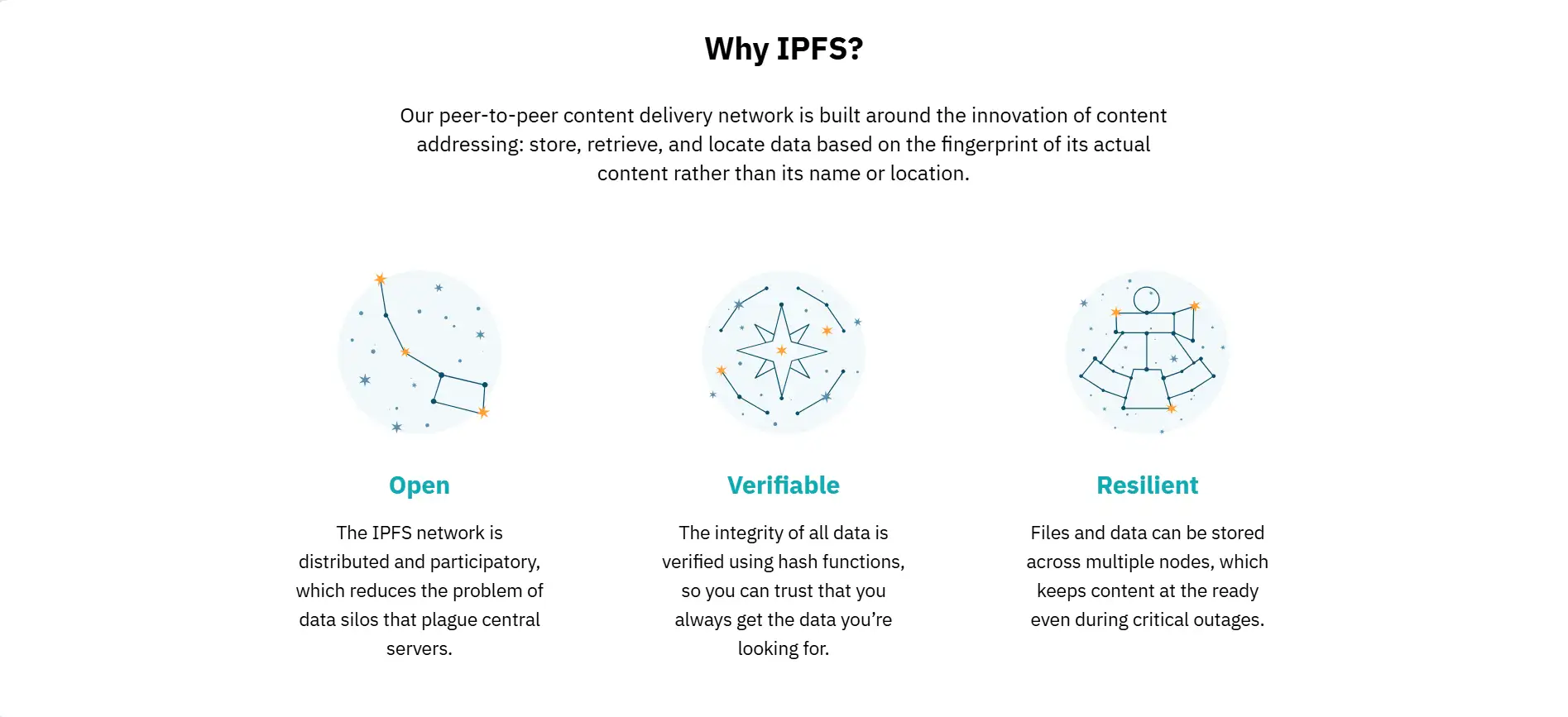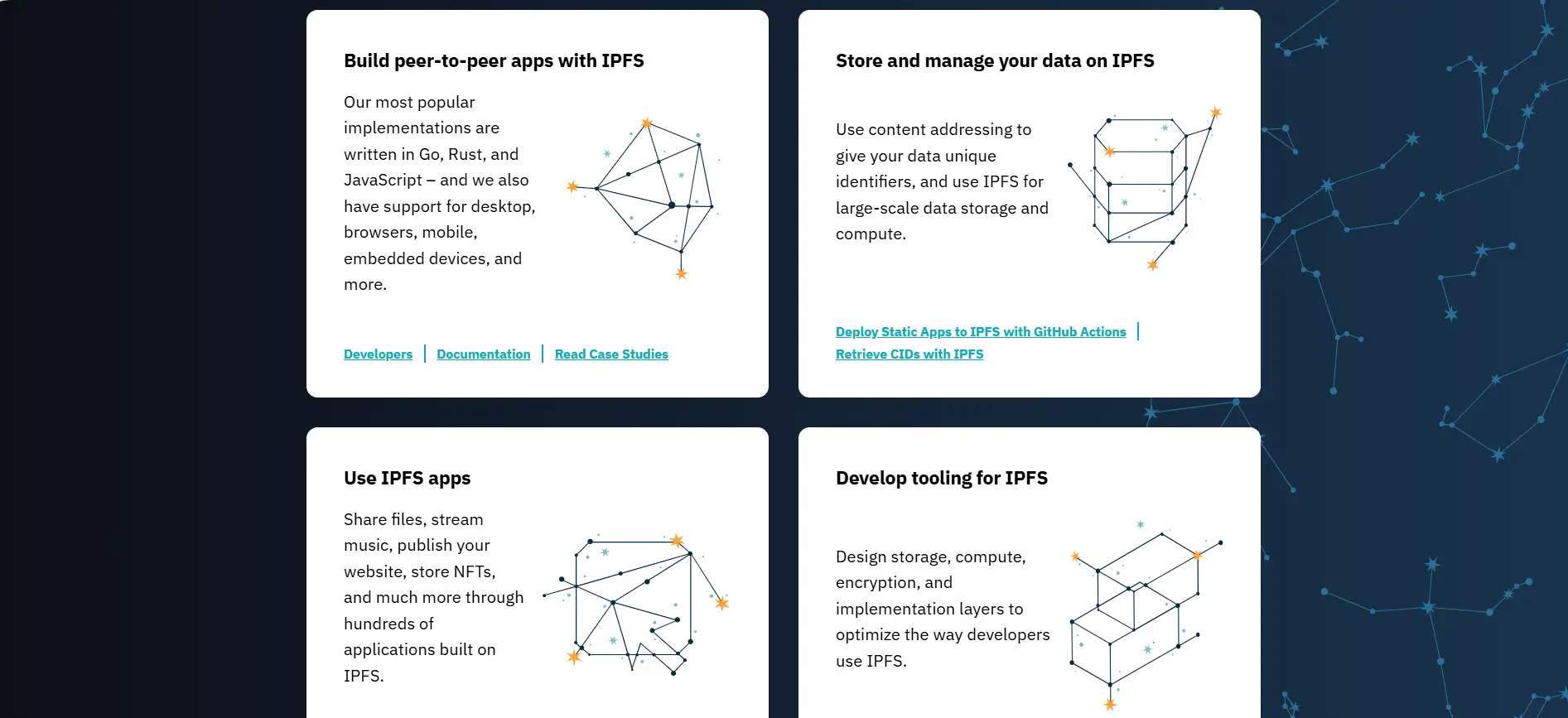About IPFS
IPFS (InterPlanetary File System) is a decentralized, open-source protocol designed to create a faster, safer, and more resilient internet. At its core, IPFS allows users to store, retrieve, and share files using a unique content addressing system that replaces traditional location-based URLs. Instead of relying on central servers, IPFS uses peer-to-peer networks to distribute content across nodes globally, ensuring data is both verifiable and unstoppable.
By solving problems like data centralization, censorship, and availability, IPFS is not only reinventing file storage but is also empowering entire industries. From offline-native productivity tools to in-orbit data nodes and censorship-resistant publishing, IPFS provides the infrastructure to store knowledge, share truth, and preserve content with complete integrity across space and time.
IPFS is a decentralized protocol that enables users to address and transfer data across networks using content-based identifiers instead of traditional URLs or IP addresses. The system revolves around the concept of Content Identifiers (CIDs)—cryptographic hashes that verify the authenticity and immutability of the data they represent. This innovation makes IPFS an ideal solution for applications requiring data integrity, censorship resistance, and global access.
Founded by Protocol Labs, IPFS is not just a tool—it’s an ecosystem supporting developers, artists, scientists, and even space agencies. Real-world use cases reflect its versatility: Wikipedia was mirrored on IPFS after being blocked in Turkey, 3S Studios reduced their Unity game’s size drastically using IPFS, and Lockheed Martin launched an IPFS node into space to improve interplanetary communication. These examples illustrate the protocol's power to deliver speed, resilience, and long-term storage beyond traditional digital boundaries.
IPFS is fully open-source and boasts more than 280,000 active nodes, over 1 billion CIDs, and a vibrant community of over 2,000 contributors. Unlike centralized cloud platforms, which often become data silos, IPFS promotes interoperability and open collaboration. It is not a standalone product but a foundational layer for applications like NFT.storage, Snapshot, and others building decentralized content, DAOs, and permanent web archives.
IPFS provides numerous benefits and features that make it a vital component in the decentralized internet stack:
- Content Addressing: Files are accessed using cryptographic hashes (CIDs), ensuring data integrity and eliminating risks of manipulation or link rot.
- Decentralized File Storage: Unlike traditional cloud storage, IPFS distributes data across multiple nodes globally, reducing reliance on centralized servers and making data censorship-resistant.
- Built-in Versioning: IPFS supports historical versions of data, enabling immutable backups and complete content history retrieval.
- Offline-First Support: Applications can be designed to run offline and sync later, making IPFS an excellent choice for intermittent connectivity environments or disaster zones.
- Interplanetary Applications: IPFS has already been used in space-bound nodes, proving it’s capable of enabling more efficient data sharing even beyond Earth.
- Community-Powered Ecosystem: With over 2,000 contributors and tools like Kubo, Helia, and IPFS Cluster, developers have access to powerful integrations and an active support network.
- Open Standards: As an open-source protocol, IPFS promotes transparent development and is supported by a wide range of libraries in JavaScript, Go, Rust, and other languages.
- Multi-Industry Adoption: Used by scientists, artists, DAO platforms like Snapshot, and even national archives, IPFS adapts to a wide spectrum of real-world applications.
IPFS offers flexible ways to get started depending on your technical skill level and use case:
- Install IPFS Desktop: A beginner-friendly application that bundles the Kubo node with a GUI. Download it from the official IPFS website and start uploading, sharing, and pinning content right away.
-
Add IPFS to Your Browser: Use the IPFS Companion browser extension to handle
ipfs://andipns://URLs seamlessly inside Chrome or Firefox. - Deploy Static Sites: Automate deployment of static websites or apps using GitHub Actions. Add your site to IPFS in minutes and host it on decentralized infrastructure.
- Run a Node via CLI: Developers can install Kubo (the reference implementation in Go) for full node control via terminal. This option is perfect for server-side integrations or advanced scripting.
- Coordinate via IPFS Cluster: For managing distributed storage across multiple nodes, use IPFS Cluster to replicate and balance content automatically.
- Explore with Helia: Use the lightweight JavaScript implementation Helia to build IPFS-native applications directly in the browser with modern frameworks.
- Browse Apps Built on IPFS: Use apps like NFT.storage for storing NFTs, or explore others on the official app directory.
- Join the Community: Whether you're an artist, developer, scientist, or researcher, there’s a place for you in the IPFS community. Access forums, grants, and global events to collaborate and contribute.
IPFS FAQ
IPFS uses a unique content addressing system where every piece of data is identified by a cryptographic hash known as a Content Identifier (CID). If even a single byte of the file changes, the CID changes too. This system guarantees that the file you retrieve from the IPFS network is exactly the same as when it was uploaded—no tampering, no surprises.
Yes. One of the most powerful features of IPFS is its offline-native architecture. Devices within a local network can share data through IPFS without connecting to the public internet. This makes it ideal for disaster recovery zones, remote locations, and local-first applications. Data syncs back to the global network when a connection becomes available.
When the Turkish government blocked Wikipedia, a copy of the site was uploaded to the IPFS network. Since IPFS doesn’t rely on central servers, users could access the site via distributed nodes and public gateways. This real-world use case highlighted IPFS as a powerful tool for fighting censorship and preserving knowledge.
With content immutability, verifiability, and resilience, IPFS ensures that digital art and NFT metadata remain accessible and unchangeable over time. Platforms like NFT.storage rely on IPFS to provide permanent links to high-resolution files, preventing metadata loss and increasing long-term value and trust.
Lockheed Martin is integrating IPFS in orbit to demonstrate more efficient, decentralized data sharing between satellites and Earth-based systems. By eliminating the need for constant direct connectivity, IPFS can drastically improve interplanetary communications, reduce latency, and enable resilient mesh networks beyond Earth.
You Might Also Like












